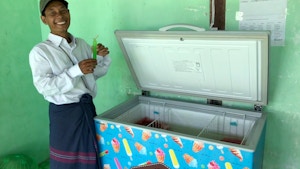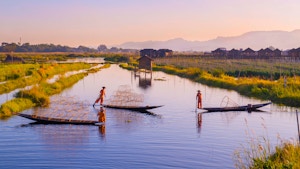Myanmar News

Carbon & Climate
Seeing mangroves regrow: A visual story on the surprise resurgence of Iloilo’s coastal forests
On International Day for the Conservation of the Mangrove Ecosystem, Eco-Business looks at the unexpected rapid growth of a thriving mangrove forest in Iloilo City, Philippines, following the completion of a man-made floodway.

A look at Southeast Asia's evolving landscape of solar energy adoption, from achievements to hurdles and future aspirations.

Policy & Finance
Odd jobs, digital cards help Rohingya refugees navigate aid cut
Seven years after fleeing conflict in Myanmar, displaced Rohingya struggle with aid squeeze in world's biggest refugee camp.

As extreme heat events become more frequent, Asian cities are under pressure to protect their most vulnerable citizens.
Policy & Finance
Diversity, equity and inclusion: Asia urged to look beyond gender
Myanmar Opinion

Carbon & Climate
Strengthening Asia’s voice for sustainable development
Eco-Business has launched new subscription plans for our community. We invite you to support our independent journalism and thought leadership initiatives to forge a sustainable Asia and beyond.

Asean states need to unite on a common stand to beat plastic waste, but national and local efforts matter too.

Governments in the region must fix their opaque regulatory frameworks and make use of innovative financing models, says analyst Shantanu Srivastava.

Policy & Finance
Catalytic capital holds the key to Southeast Asia’s green transition
A coordinated approach both regionally and globally is needed to ensure a just energy transition in Southeast Asia that stimulates economic growth.
Policy & Finance
How technology can help save Indigenous forests – and our planet
Policy & Finance
Southeast Asia’s need to bridge the climate financing gap
Carbon & Climate
Exploring the intersection of business and our ecology
Myanmar Videos

Southeast Asian nations are racing to bring clean, affordable power to their people, but one country is outrunning them all. How can states make their renewable energy transition a success?

EB Studio
In line with the Sustainable Development Goals' aim to eradicate poverty, a Japanese multinational electronics firm is providing power supply stations, solar storage and products to countries with little or no access to electricity.

Food & Agriculture
Water-saving tech, veg gardens grow hope in Myanmar’s Dry Zone
In parched lands, families grow food in gardens using drip irrigation, hydroponics and soil moisture sensors to cut down on over-irrigation and save water.

The Rockefeller Foundation is looking for more cities willing to build economic, social and physical resilience amid a rapidly urbanising world. Submission of applications for the 100 Resilient Cities Challenge ends on September 10.
Myanmar Press Releases

ASEAN Centre for Biodiversity
World Wetlands Day 2024: Securing the health and wellbeing of Asean communities

Asian Species Action Partnership
New roadmap sets the course for urgent conservation of freshwater fishes in Southeast Asia

Asian Development Bank (ADB)
Asean needs to focus on boosting quality of life to build resilient, inclusive community: ADB report

NEU Battery Materials
NUS GRIP Deep tech start-up, NEU Battery Materials raises S$800,000 in seed funding
Myanmar Research

BirdLife International
State of the World's Birds 2018—taking the pulse of the planet













